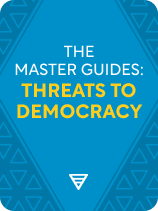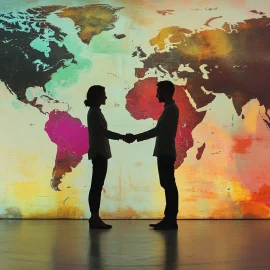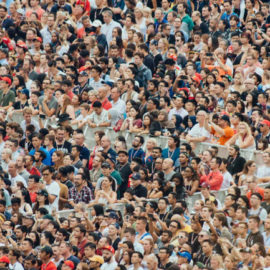

This article is an excerpt from the Shortform book guide to "The Master Guides: Threats to Democracy" by Shortform. Shortform has the world's best summaries and analyses of books you should be reading.
Like this article? Sign up for a free trial here.
Are you tired of the constant political bickering? Is there a way to bridge the divide between opposing sides?
Shortform’s Master Guide to Threats to Democracy explores solutions to political polarization, offering strategies to heal deep social divisions. It presents three expert-recommended approaches to overcome the hostilities that threaten democracy’s functionality.
Read on to discover how forging diverse coalitions, engaging in local politics, and finding empathy for your opponents can help mend our fractured political landscape.
Solutions to Political Polarization
So much of what threatens democracy comes from deep social divisions: mutual hostilities between opposing political camps that increasingly see one another as alien and dangerous. Under such conditions, democracy becomes steadily unworkable. Therefore, to preserve democracy, pro-democratic forces must overcome deep social divisions. Experts note three potential solutions to political polarization:
- Forging diverse coalitions
- Engaging in local politics
- Finding empathy for your political opponents
1) Forge Diverse Coalitions
In How Democracies Die, Levitsky and Ziblatt address the first strategy to overcome social divisions: forging broad, pro-democratic coalitions that cut across racial, ethnic, religious, and socioeconomic lines. In their analysis, it isn’t enough to simply build interest groups of like-minded activists. A broad coalition would entail liberals reaching out to conservative businesspeople, evangelicals, gun owners, and other traditional opponents. These groups all have sharp disagreements with one another on a range of issues, but would all potentially stand to lose if authoritarianism gained a stranglehold.
Levitsky and Ziblatt contend that, by their very nature and composition, these coalitions can appeal to a broader slice of the country and transcend the partisan divide. This defuses some partisan tensions, they argue, which can lead to depolarization and a strengthened democracy.
2) Engage in Local Politics
Writing in Why We’re Polarized, Klein explores the second of our strategies for overcoming social divisions: engaging in politics at a more local level. The routine concerns of local politics can often transcend ideological and identity-based grievances and bring different people together, fostering healthier democratic cooperation. By attending meetings of your local school board or engaging with local civic and nonprofit organizations, he writes, you’ll likely find that your neighbors—regardless of their party affiliation—still share the same desires for good roads, quality schools, and clean and honest government.
In A Promised Land, Obama makes a similar observation to Klein. He notes that democracy at the local level is often far more functional and can highlight points of agreement rather than division. Based on conversations with more conservative voters, Obama notes that traditional dividing lines in political life—white and Black, native-born and immigrant, conservative and liberal—obscure how most voters generally share the same set of concerns.
Although there are political disagreements, writes Obama, people everywhere worry about bread-and-butter issues like the cost of health care, the quality of education, and making sure their kids can enjoy even greater opportunities than themselves. According to Obama, despite the divisions, what unites us is far stronger than what divides us.
3) Find Empathy for Those You Disagree With
Following on the same theme as Klein and Obama, Hochschild (Strangers in Their Own Land) examines the third of our strategies for bridging social divisions: bringing liberals and conservatives together to overcome the compassion barrier that separates them. Each side, she writes, is too busy demonizing the other and reacting to caricatures of its political opponents, rather than substantively engaging with what the other side really believes and why they believe it.
In the US, for example, conservatives must recognize that liberals do not wish to impose their values on them or judge them for how they live their lives. And liberals must recognize that conservatives are not motivated solely by bigotry and hatred, nor are they uneducated or unsophisticated. Rather, their political beliefs and resentments stem from a long history of feeling marginalized and discarded by mainstream American culture.
By speaking more honestly with one another on an individual level and breaking out of their respective bubbles, liberals and conservatives would find that there is much that they actually have in common. On some level, she notes, both groups believe that the American economy has become unfair and rigged, with liberals believing that wealthy and powerful corporations are taking up too large a share of national income, and conservatives believing that the government is unfairly rewarding the indolent and lazy over the thrifty and industrious.
Hochschild writes that, however we do it, breaking down such barriers to compassion is the only way we can bring civility back to our politics and restore public faith in democratic institutions.

———End of Preview———
Like what you just read? Read the rest of the world's best book summary and analysis of Shortform's "The Master Guides: Threats to Democracy" at Shortform.
Here's what you'll find in our full The Master Guides: Threats to Democracy summary:
- What the survival of democracy depends on
- The threats to democracy we should look out for
- How to fight back against democratic decline






